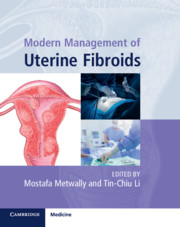Book contents
- Modern Management of Uterine Fibroids
- Modern Management of Uterine Fibroids
- Copyright page
- Contents
- Contributors
- Foreword
- Chapter 1 Pathophysiology of Uterine Fibroids
- Chapter 2 Evaluation of Uterine Fibroids Using Two-Dimensional and Three-Dimensional Ultrasonography
- Chapter 3 Ulipristal and Other Medical Interventions for Treatment of Uterine Fibroids
- Chapter 4 The Role of Magnetic Resonance Imaging in the Management of Fibroids
- Chapter 5 Fibroids and Fertility
- Chapter 6 Fibroids and Reproduction
- Chapter 7 Open Myomectomy
- Chapter 8 Laparoscopic and Robotic Myomectomy
- Chapter 9 Principles and Technique of Laparoscopic Myomectomy
- Chapter 10 Uterine Fibroids
- Chapter 11 Total Laparoscopic Hysterectomy for the Fibroid Uterus
- Chapter 12 Hysteroscopic Resection of Submucosal Fibroids
- Chapter 13 Modern Management of Intramural Myomas
- Chapter 14 Outpatient Myomectomy
- Chapter 15 Vaginal Hysterectomy with Fibroids
- Chapter 16 Leiomyosarcoma
- Chapter 17 MRI-Guided Ultrasound Lysis of Fibroids
- Chapter 18 Embolization for the Management of Uterine Fibroids
- Chapter 19 Uterine Fibroids in Postmenopausal Women
- Appendix: Video Captions
- Index
- References
Chapter 9 - Principles and Technique of Laparoscopic Myomectomy
Published online by Cambridge University Press: 10 October 2020
- Modern Management of Uterine Fibroids
- Modern Management of Uterine Fibroids
- Copyright page
- Contents
- Contributors
- Foreword
- Chapter 1 Pathophysiology of Uterine Fibroids
- Chapter 2 Evaluation of Uterine Fibroids Using Two-Dimensional and Three-Dimensional Ultrasonography
- Chapter 3 Ulipristal and Other Medical Interventions for Treatment of Uterine Fibroids
- Chapter 4 The Role of Magnetic Resonance Imaging in the Management of Fibroids
- Chapter 5 Fibroids and Fertility
- Chapter 6 Fibroids and Reproduction
- Chapter 7 Open Myomectomy
- Chapter 8 Laparoscopic and Robotic Myomectomy
- Chapter 9 Principles and Technique of Laparoscopic Myomectomy
- Chapter 10 Uterine Fibroids
- Chapter 11 Total Laparoscopic Hysterectomy for the Fibroid Uterus
- Chapter 12 Hysteroscopic Resection of Submucosal Fibroids
- Chapter 13 Modern Management of Intramural Myomas
- Chapter 14 Outpatient Myomectomy
- Chapter 15 Vaginal Hysterectomy with Fibroids
- Chapter 16 Leiomyosarcoma
- Chapter 17 MRI-Guided Ultrasound Lysis of Fibroids
- Chapter 18 Embolization for the Management of Uterine Fibroids
- Chapter 19 Uterine Fibroids in Postmenopausal Women
- Appendix: Video Captions
- Index
- References
Summary
Uterine fibroids are the most common benign neoplasms of the female reproductive tract with an estimated incidence of 25–30% at reproductive age [1]. They are detected by ultrasound in about 70–80% of women by the age of menopause [2]. About 30% of fibroids produce symptoms such as abnormal uterine bleeding (AUB) which may result in anaemia, pain or pressure effects on contiguous structures such as urinary incontinence, urinary frequency, urinary outflow obstruction, hydronephrosis, constipation and tenesmus. Fibroids may also be associated with subfertility, and with adverse pregnancy outcomes such as miscarriage and fetal malpresentation [3]. The symptoms associated with fibroids are known to compromise quality of life [3].
Information
- Type
- Chapter
- Information
- Modern Management of Uterine Fibroids , pp. 78 - 89Publisher: Cambridge University PressPrint publication year: 2020
